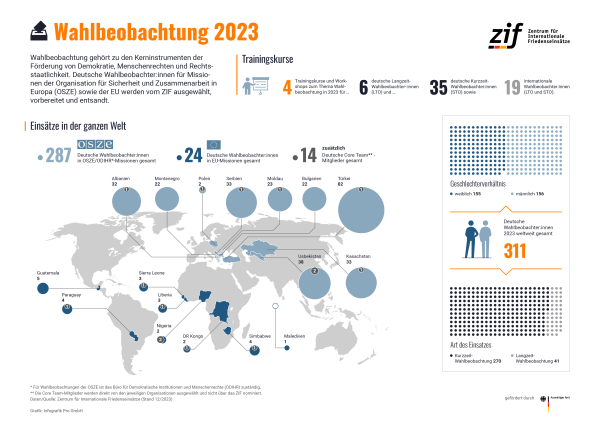Election observation with ZIF – review and prospect

Start of the "super election year" 2024: elections were held in Bangladesh, Taiwan and Finland in January. Azerbaijan, Indonesia, Pakistan, Senegal and Belarus will follow in February; later in the year, Russia, Iran, Ukraine, South Korea, South Africa, Tunisia, Sri Lanka, North Macedonia, Mexico, India, Austria, Bosnia and Herzegovina, Chad, Georgia, Ghana, Venezuela, South Sudan, the UK and the USA will also take part. If you add up the population of all voting countries, you get more than half of the world's population - although not all of them have the right to vote due to their age.
Elections are an important component for democratic legitimacy. International organizations send so-called election observation missions to verify their transparency and conformity in accordance with the respective country's legislation. Among the best-known and most renowned international organizations in this field are the Organization for Security and Co-operation in Europe, OSCE, and the EU. They have long-developed toolkits and methodologies for observation, and their personnel are provided by the respective member or participating states. Germany has always been particularly active in the field of election observation and regularly provides 10 to 15% of the staff of OSCE election observation organizations (which are organized and evaluated by their Office for Democratic Institutions and Human Rights, ODIHR, based in Warsaw).
ZIF's mandate is to recruit, select and train German election observers on behalf of the German government and to accompany them on their missions. Every year, we train around 30 and deploy an average of around 300 election observers.
In 2023, exactly 311 election observers were temporarily under contract with us, 155 of whom were women. 270 of them were on short-term election observation assignments of around one week around election day, while 41 were in the country for up to eight weeks as long-term election observers. The largest mission in terms of personnel from a German perspective was the observation in Turkey in two rounds of voting.
"I am delighted that 14 German experts worked in the missions' core teams for the first time - a new record," says Rebecca Meier, who is in charge of the thematic area at ZIF. "This shows that gradual qualification can also be successful among election observers - and that election observation is no longer just an honorary position with expense allowances, but a valid professional field in the area of democratization."
"We have a very active, committed and interested community in the field of election observation," continued Meier. "Many are also active as election workers because they know that the right to vote is an important democratic asset. We at ZIF are looking forward to the election year 2024 with anticipation- also in view of the first cancellations of election observations, such as in Belarus or Russia."
The team at ZIF is currently busy with the selection process for future observers: the annual application window was open until the end of January, and over 300 applications for more than 20 places on training courses in 2024 were received, which are now being screened and validated to invite suitable candidates for training and prepare them for future assignments. ZIF expects to open the next application window at the beginning of 2025.
More about Election observation
To the election calendar of OSCE ODIHR
To the Foreign Policy feature on Elections 2024 with informative graphics and maps